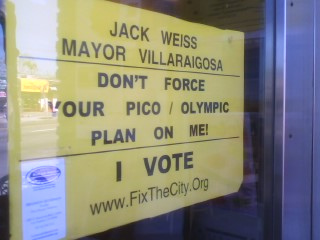
LADOT Should Have Learned Lesson 3
A recent article in the Institute of Transportation Engineers Journal, found here at Red Orbit, discusses the five important lessons that every transportation engineer should learn. When I was saw the title of the article, I was hopeful that it was going to be about how transportation engineers need to be progressive and think outside the box. I was dissapointed.
When Nicholas Whitaker and I went on a car ride with Deborah Murphy, she expressed exasperation that transportation engineers are still so concerned with "improving" roads as the key to more efficient transportation. Sometimes, because the readers of this blog and many of the planners and engineers to whom I speak are more progressive, it's easy to forget how far we have to go to change the culture of transportation engineers.
Without further adieu, here is the list of five lessons every transportation engineer needs to know. Remember, this article was written by transportation engineers, for transportation engineers:
lESSON 1(sic): ONlY(sic) TRAFFIC ENGINEERS/ PIANNERS (sic) UNDERSTAND THE CONCEPT OF LEVEL OF SERVICE
LESSON 2: TRAFFIC ENGINEERS/ PLANNERS KNOW TOO MUCH MATH
LESSON 3: THE PUBLIC OFTEN ARE THE REAL LOCAL TRAFFIC EXPERTS
LESSON 4: VISIT THE STUDY AREA SEVERAL TIMES DURING THE PROJECT, ESPECIALLY DURING THE MOST RELEVANT TIME PERIODS AND JUST BEFORE KEY MEETINGS
LESSON 5: UNDERSTAND EACH JURISDICTION'S TRAFFIC STUDY REQUIREMENTS, DESIGN STANDARDS AND HEARING/ MEETING PROCEDURES
Ok, so the five things transportation engineers need to know breaks down like this: "We're smarter than everyone else. However sometimes people whiners catch us because they know local conditions better than we do if we don't live in the study area. Try and learn as much as you can about the local road conditions and don't get slipped up by public process."
I would humbly suggest five other lessons that might be more relevant given what we're seeing in our cities and around the world. I'm so confident that my lessons are better, that I won't resort to shouting at you.
Lesson 1: There are ways to move people that don't involve cars.Lesson 2: Transportation projects should enhance the community character, not destroy itLesson 3: Environmental studies are part of the process of deciding how to proceed. Not something that should be rushed or subject to politics.Lesson 4: Community plans are important guidelines in designing a road project. Don't ignore themLesson 5: Listen to the people that live and commute in the study area. Projects get completed faster if there isn't a judge involved
If you can think of any other suggestions, please feel free to fill up the comments section.
Image:revolute/Flickr





